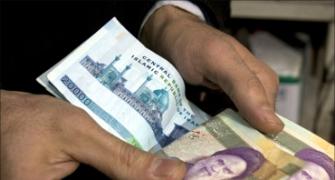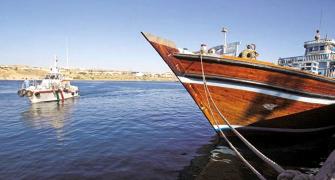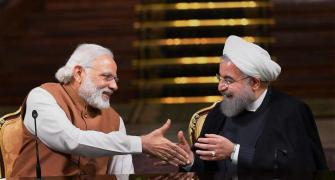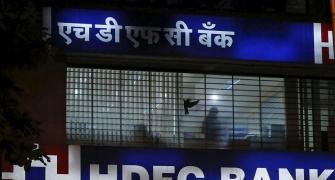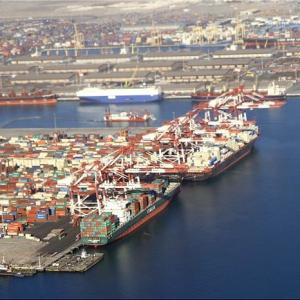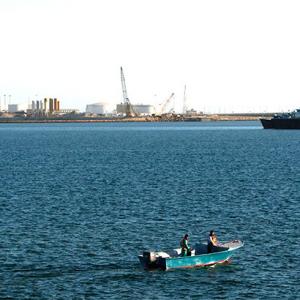Iran's growing proximity to China may have also played a part, report Shine Jacob and Megha Manchanda.
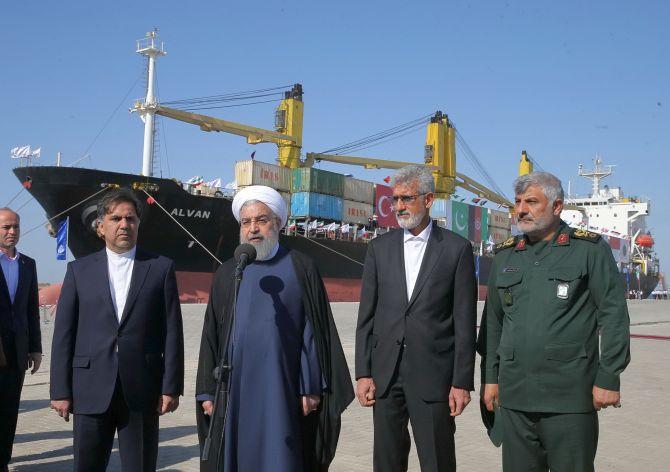
Iran has ended its agreement with India for two key projects, the second phase of Chabahar port and development of the Farzad-B block, reflecting the souring relations between the once strong allies.
The West Asian country will fund and develop a rail link under the second phase of the Chabahar port on its own while the contract for developing the Farzad-B block is likely to be handed over to a local company following slow progress by ONGC Videsh,
In the historic New Delhi Declaration signed on January 25, 2003, both countries had decided to jointly develop the Chabahar port complex and the Chabahar-Fahranj-Bam railway link.
Since then, the Chabahar project, along with the Farzad-B block deal, has been something that forced India to play a balancing act between the US and Iran.
In 2020, both projects appear to be out of India's hands.
While the first phase of the Chabahar port was developed by India, US sanctions stopped progress in the second phase.
Though the initial agreement was signed in 2003, a contract was signed between India and Iran to develop the 628-km railway line along the Iran-Afghanistan border, in 2016.
"The idea of Chabahar port was brought back on the table in 2014," says former shipping secretary Vishwapati Trivedi. "Several exchanges happened between the two countries before finalisation of the infrastructure development by India in Iran."
The initial agreement signed in May 2015 translated into a formal 10-year contract.
Both the Kandla port and the Jawaharlal Nehru Port Trust were entrusted with the job of developing Chabahar port.
The then chairman and managing director of the Shipping Corporation of India was given charge of Indian Ports Global -- a special purpose vehicle for execution of the contract.
A revenue-sharing pact with a minimum guarantee throughput (MGT) was agreed upon, based on which Iran wanted India to increase traffic at Chabahar port.
MGT is the lowest number of cargo and passengers that can pass through a port on a daily basis, from arrival at the port to loading onto a ship.
Now, Iran has indicated it will provide $400 million from the Iranian National Development Fund for the railway line.
As part of the deal, Indian Railways's arm IRCON was supposed to provide $1.6 billion for the rail project.
People in the know said IRCON could not move ahead with the project because of US sanctions on Iran.
In addition, Iran's growing proximity to China may have also played a part. Iran and China are set to sign a deal worth $400 billion, lining up an investment roadmap for the next 10 years.
Even when US sanctions were on a high, India had kept the project on the discussion table. However, strengthening India-US relations under US President Donald J Trump forced India to go slow on Iran projects.
A prime example was the halt in oil imports from Iran following the recent US sanctions.
Earlier in 2006, India and Iran had conducted a joint naval exercise prior to then US president George W Bush's visit to India.
During the drill, a top official had termed Chabahar as key to maritime relations between both countries, addressing 220 sailors.
Iran grew sceptical of India's diplomatic ties with the US and is believed to have delayed certain regulatory clearances that, in turn, affected the project.
Just like the Chabahar railway line, US sanctions came in the way of Farzad-B gas field. Last week, Masoud Karbasian, MD, National Iranian Oil Company, said the deal for development of the field would be signed soon.
An Indian official source, aware of the development, says, "There is no development at present on Farzad-B. It seems Iran is trying to rope in a local player."
hough India had been looking to secure a contract for the gas field since 2009, the sanctions against Tehran played spoilsport.
Around 75 per cent of the deal was finalised by May 2018 when the US unilaterally withdrew from the nuclear deal and announced sanctions on Iran.
The Farzad-B block has gas reserves of 21.6 trillion cubic feet. The major dispute between India and Iran was over setting up of two pipelines, and also over money to be quoted on the development plan, says the source, adding that the Indian firm wanted only one pipeline.
The contract for the block was signed on December 25, 2002, by the consortium comprising ONGC Videsh, Indian Oil Corporation, and Oil India for carrying out exploration in the Farsi offshore block.
The contract expired in June 2009 after declaration of commerciality of the block, based on the gas discovery of Farzad-B gas field.
When the US sanctions were lifted following the nuclear deal with then president Barack Obama, Iran had increased its demands with Indian negotiators for Farzad.
Iran's administration had even hinted about giving the project to a Russian or Chinese firm. In August 2019, Iran indicated that it may not wait for India now.


